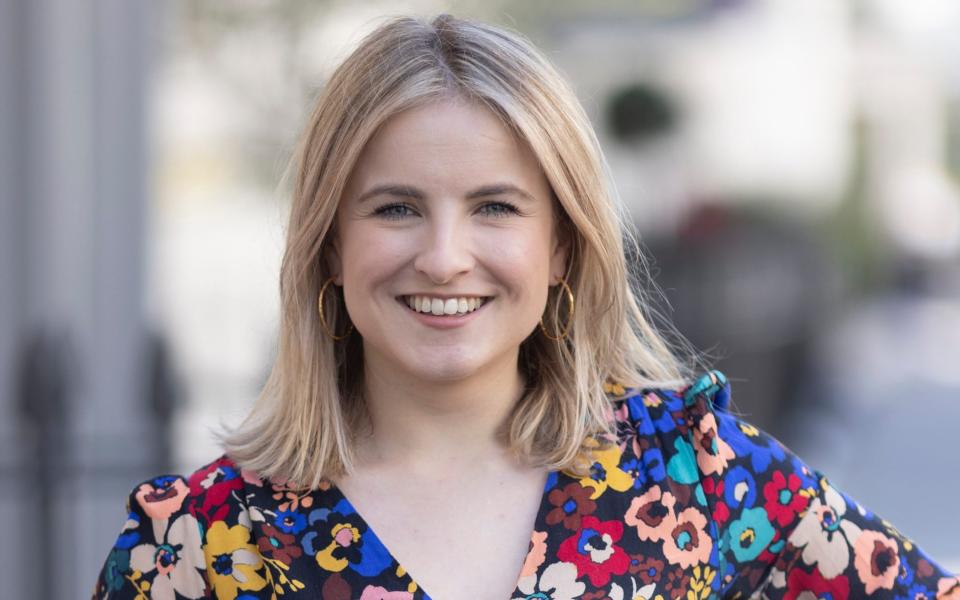I’m 26 and I would rather have a dog than a baby

There is an advert for Tinder, the dating app, that shows a young couple beside a pram with the slogan, “Finally Having Kids”. But in the pram there is no newborn. Instead, there is a dog.
This is a sign of the times. For many young women, “fur babies” are taking the place of human babies, at least for the time being. One 34-year-old friend has an English bulldog who is “hand-fed sausages” and “likes to be swaddled”.
“Instead of buying her dog toys, I buy her Jellycat soft toys, which drives my husband mad as they’re so expensive,” says her owner.
On Wednesday, a study from the University of Oxford revealed that childbirth in England and Wales has fallen to its lowest recorded level over the past decade: from 1.94 in 2010 to 1.55 in 2021.
Instead, we are a generation of pup parents: every café, pub and park near my home in London is packed with pampered puppies to coo over. Their owners are millennial couples in their late 20s and early 30s who, not so long ago, would have been more likely to be seen with a Bugaboo than a cockapoo.
The traditional checkpoints of adulthood – a stable career, home ownership and marriage – are being pushed further and further back. The Tinder advert may be meant in jest, but it points to a serious phenomenon. More women are putting off having children or choosing not to have them at all. Like much of the world, Britain is facing a baby bust. Half of women in England and Wales do not have children by the age of 30.
It’s not difficult to work out why: most of my friends rent rooms in flatshares or live in one-bed flats. House prices have risen from about four times average earnings in the mid-1990s to more than nine times average earnings now; it is not easy (or in many cases even possible) to climb the property ladder.

Falling wages and rising bills mean that, even if women wanted to have children sooner, many can’t afford them. And sky-high childcare costs mean that most young women still feel they would be forced to choose between their career and raising a family. Doggy daycare might be pricey, but it’s got nothing on 18-plus years of childcare responsibilities.
A dog it is, for now. My boyfriend and I have discussed the possibility of getting a puppy with all the seriousness of naming our firstborn. Full-time office work and a lack of outdoor space (not to mention our respective flatmates) currently preclude us from getting one. Out of desperation, I used to dog-sit a local shih tzu called Rafferty.
“I’m the same age as my mum was when she had her first child, but it’s just not feasible for us in terms of space, time or my career,” says one friend in her late 20s. She is the proud mother of a 10-month-old cockapoo.
Not only are we getting dogs instead of having babies – even if only as a stopgap – we are treating dogs like babies and anthropomorphising them to an ever greater degree.
A whole industry has sprung up to sell treat-dispensing dog “baby” monitors and personalised pet food. When friends become first-time dog parents, it is almost as if they have a newborn: we meet them to walk round the park with their puppy in a sling. I understand when they have to cancel as they can’t get a babysitter. Except instead of a baby, their beloved offspring is a dachshund.
After getting her miniature schnauzer puppy, another friend in her early 30s said she would go into the office exhausted. “I was up with the dog last night because he was crying and couldn’t settle,” she’d say, to the amusement of colleagues without children and the raised eyebrows of parents of toddlers.

“While other people in the office have their kids as their phone wallpaper, mine’s the dog, and my camera roll is full of pictures of him,” she says. “It would be nice to have kids, but at the time we lived in a small flat and now we can’t afford to. I do think the dog has filled that role; having him has made us realise that having a kid on top of that just isn’t possible at the moment.”
The issue of declining fertility is top of the agenda for some politicians, such as Conservative MP Miriam Cates, who recently told the National Conservatism conference that falling birth rates are “the most pressing issue of our generation”. In a speech, she said: “In recent years there has been a significant increase in the number of women who want to have children but don’t, with some analysts predicting that about 30 per cent of women may never become mothers.”
I put this to leading fertility expert Zita West. She says it’s not true that, in your mid-30s, fertility “falls off a cliff”. But she does say there’s a biological imperative and “some women are more fortunate than others regarding their egg reserves. It’s a worry for a lot of women that life is uncertain and jobs are uncertain, but the difficult thing about delaying fertility is how long it can take to actually get pregnant.”
People may mock those who proudly proclaim to be “dog mums”, but it is not hard to see how canine companions have become a way to bridge the gap. No Terrible Twos, no nappies to change; and, of course, dogs are (wo)man’s best friend.

 Yahoo News
Yahoo News 
